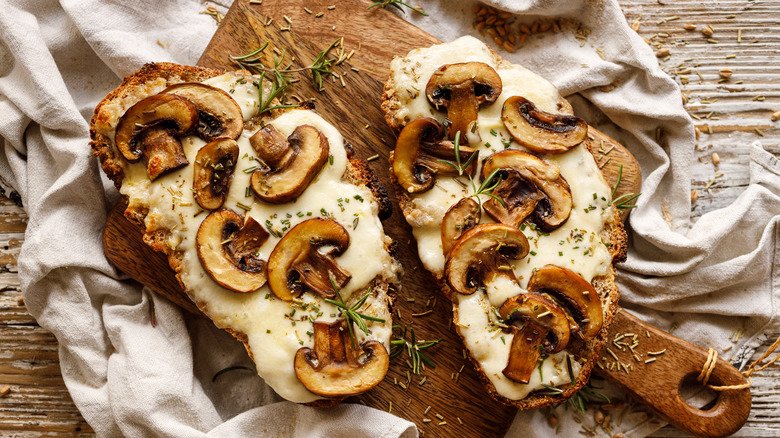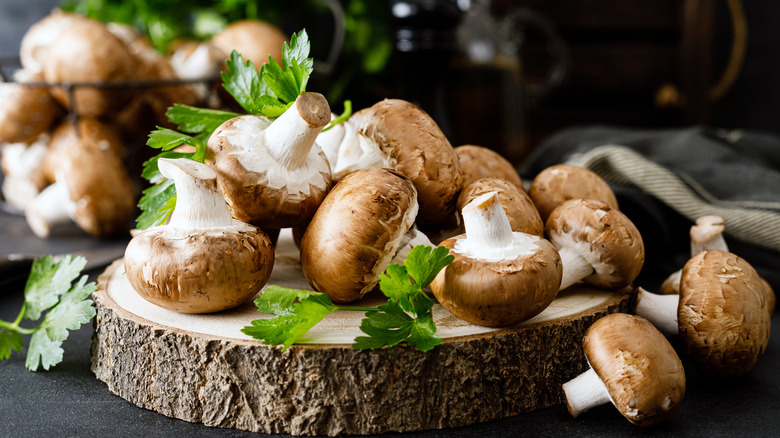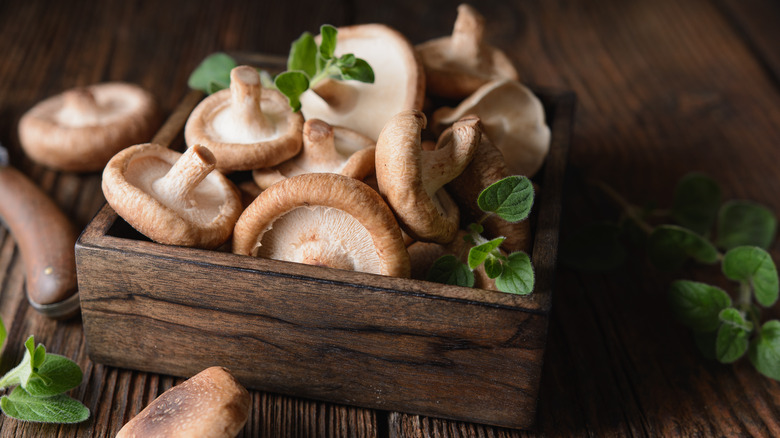What Happens To Your Body When You Eat Mushrooms Every Day
Although they are often categorized as vegetables, mushrooms are actually a type of fungi that have long been used for both their nutritional value and medicinal properties. Known for their great taste and several health benefits, mushrooms are packed full of protein, vitamins, and minerals (via Runner's World). They're also one of the few foods that actually contain a high concentration of vitamin D, which can help strengthen your bones by promoting calcium absorption. In addition, mushrooms are rich in fiber and immune-boosting antioxidants, and as an added bonus, they are low in carbohydrates and fat.
One study found that adding half a cup of mushrooms to your daily diet can actually increase your overall intake of zinc, potassium, fiber, and vitamin D. According to Natalie Rizzo, a registered dietician, there is no downside to eating mushrooms every day, especially if you're an athlete. In fact, you could eat them three times a day if you really wanted to. "If you're relying on them for vitamin D, then I definitely recommend eating them at least once per day," Rizzo told Runner's World.
The health benefits of mushrooms
Aside from supporting good bone health and immune function, mushrooms are linked to a variety other important health benefits. For instance, eating mushrooms every day can help improve heart health (via Medical News Today). That's because mushrooms contain potassium, which can help lower and regulate blood pressure. This may reduce the risk of hypertension and cardiovascular disease.
Since mushrooms are a good source of dietary fiber, they can also help with weight loss and weight management (via Insider). Fiber can help regulate digestion and improve gut health, which may promote weight loss. Some mushrooms also have a thick, meaty texture, which makes them a great low-calorie and low-fat alternative to red meat. Furthermore, eating mushrooms on a daily basis may even help prevent cancer. Although further research is needed, one study found that women who ate more mushrooms were less likely to develop breast cancer. This may be due to the fungi's anti-inflammatory properties.
What is the healthiest mushroom?
While all mushrooms are good for you, some are actually healthier than others. There are a wide variety of different types of mushrooms with different nutritional profiles, all of which offer important health benefits. The mushroom with the most extensive benefits, however, is the shiitake mushroom. According to MEL Magazine, shiitake mushrooms are by far the healthiest mushrooms and have been touted for their medicinal properties for hundreds of years.
Like most mushroom varieties, they are full of vitamin D, which can help support bone health and cellular growth. However, they're also loaded with fatty and amino acids. David Friedman, a nutritionist and author of "Food Sanity: How to Eat in a World of Fads and Fiction," told MEL Magazine that the amino acids in shiitake mushrooms can help boost immune function, enhance energy levels, and even improve mental focus. On the other hand, fatty acids, like linoleic acid, can help promote weight management and increase muscle mass.
What are the healthiest ways to cook mushrooms?
One of the great things about mushrooms is their versatility, especially when it comes to cooking. In fact, mushrooms can be prepared in a number of different ways. You can fry, sauté, or even boil them. Some cooking techniques, however, can cause them to lose their full nutritional value. According to a 2016 study published in the International Journal of Food Sciences and Nutrition, the healthiest ways to cook mushrooms include grilling and microwaving them (via Time).
Upon evaluating the influence of certain cooking techniques on the nutritional value of mushrooms, researchers at the Mushroom Technological Research Center of La Rioja in Spain found that certain cooking methods like frying or boiling caused mushrooms to lose a substantial amount of protein and antioxidants, reported Time. That's because the nutrients in mushrooms are more likely to leach out when cooked in liquids, like water and oil. However, by grilling and microwaving them, you preserve their nutritional properties as much as possible.




